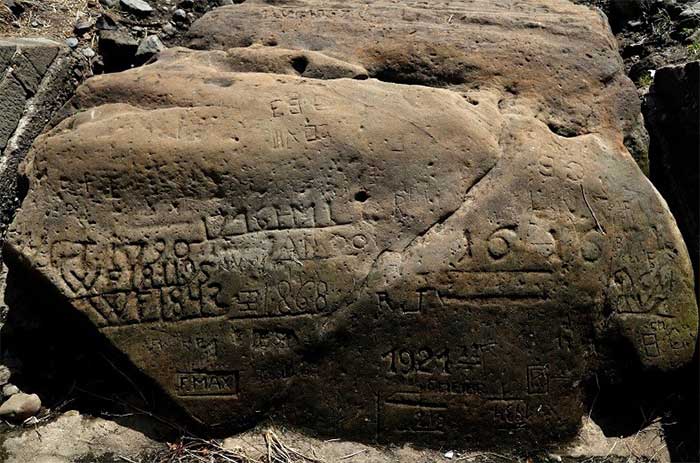In Europe, due to drought conditions causing rivers to dry up, a phenomenon known as “hunger stones” has emerged, signaling impending disasters, according to a report from the Dutch newspaper NU.

“Hunger stones” warn of drought under the Elbe River in Decin, Czech Republic. (Source: AP).
Hunger stones refer to the rocks and riverbanks that bear inscriptions indicating water levels over the years. They serve as warnings of difficult times ahead due to the depletion of rivers. If the water flow recedes to reveal such signs, it is a clear indication that drought, crop failure, and famine are imminent. Historians confirm that the earliest traces on these “hunger stones” appeared in the 15th century.
Over the centuries, “hunger stones” have frequently been mentioned in the media as ominous signs of impending major disasters. For example, in the 20th century, stones surfaced from the water in 1918, during World War I.
“Hunger stones have been found again on the dry stretches of the Rhine River. In the Netherlands, we have never seen the river’s flow weaken to this extent,” the article stated.
The authors of the article noted that these disaster-warning stones are most commonly found in the basins of the Rhine and Elbe rivers. Conversely, in some areas, markings on coastal rocks indicate excessively high water levels and warn of flooding. This year, climatologists are sounding the alarm due to the ongoing water scarcity.
Olaf Kens, a Dutch journalist from the RTL television channel, also commented on his personal Twitter account about the emergence of such stones.
“Horrifying. Due to the drought in European rivers, hunger stones have resurfaced. They echo the terrifying warnings from our ancestors in the 15th century about disaster,” the journalist reflected.
Previously, Bloomberg reported on the record drought and depletion of rivers across Europe. Experts predict a significant reduction in river transport capacity. Amid the energy fuel crisis caused by reduced gas supplies from Russia, the urgent situation regarding rivers will further impact the cost of living in European countries.





















































